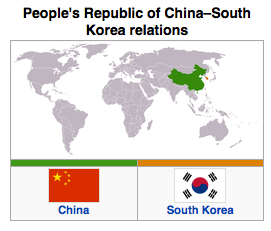China-South Korea Presidential Summit: Fait Accompli? – Analysis
By IPCS
By Jayadeva Ranade
The three day (9-11 January 2012) visit by South Korean President Lee Myung-bak to Beijing came at a time of heightened tension in the Korean Peninsula and political sensitivity for Beijing, following the untimely demise of North Korean leader Kim Jong-il. Over the past year, China’s relationship with South Korea has also been subject to strain due to sovereignty and territorial issues. Geo-political and economic compulsions have however, motivated successive South Korean administrations to keep relations with China on an even keel.
During his sixth visit to China, his second since he became the President in February 2008, Lee Myung-bak, President of the Republic of Korea (ROK), was received with due protocol. In his meeting with the top three leaders of China, the South Korean President was accompanied by a delegation of high-level dignitaries.

Since the 2008 elections, his administration has adopted a tough stance towards the Democratic People’s Republic of Korea (DPRK). It has consistently declined the passage of food or humanitarian aid unless Pyongyang explicitly admits to two provocations in 2010, namely the sinking of a ROK Navy warship and artillery firing on a ROK island which killed 50 people. Resumption of aid has been made dependent on progress in efforts to get Pyongyang to give up its nuclear programme.
Lee Myung-bak did not relent on this stance even when Kim Jong-il died on 17 December 2011 and Seoul sent no condolences or official delegation for the funeral, prompting harsh criticism and threat of unspecified retaliation by the North. The situation plummeted when recently, the official North Korean website, Uriminzokkiri, for the first time denounced ROK’s Minister for Unification by name. Meanwhile China has also found South Korea’s posture disconcerting, since it does not want tensions to derail the smooth transition of power to Kim Jong-Un in which it has a large stake. In fact, reduction of tension on the Korean Peninsula was China’s top priority during the visit.
Assuaging China’s concerns, Lee Myung-bak struck a conciliatory note. After Kim Jong il’s death, he said, a “big change is expected” and the “situation on the Korean Peninsula is now entering a new turning point.” Despite North Korea’s belligerence and amidst rumours of a likely third nuclear test by Pyongyang in the first half of this year, South Korea’s President assured “it is South and North Korea, before anyone else, that must try to achieve the task of building peace, security and reunification on the Korean Peninsula.” He asserted that South Korea is “leaving a window of opportunity open. If North Korea shows its attitude of sincerity, a new era on the Korean Peninsula can be opened.”
Coincidentally, Beijing had initiated steps to ease tensions on the Korean Peninsula just few days prior to Kim Jong-il’s unexpected death. On 14 December 2011, Beijing quietly arranged a meeting between the US special representative on Korean policy, Glyn Davies, China’s Foreign Minister Yang Jiechi, Assistant Foreign Minister Liu Zhenmin and Special Representative for Korean Peninsula affairs Wu Dawei. Later, South Korea’s nuclear envoy, Lim Sung-nam visited Beijing on 23 December and met Wu Dawei. Following these meetings, China expressed the hope that these contacts could create favourable conditions for resumption of the Six-Party talks.
In addition, a recent report disclosed that during this meeting the DPRK had requested US to resume supplies of food aid instead of milk powder and supplements. The US is yet to respond though DPRK has offered to stop the enrichment of uranium domestically. Separately, on 9-11 January a secret contact took place between Hiroshi Nakai, former Head of Japanese efforts to settle the abductees issue and DPRK representative, Song Il Ho allegedly by Chinese involvement. China had also offered, as an incentive, to start negotiations with Seoul for a Free Trade Agreement (FTA).
Reduction of tensions on the Korean Peninsula figured prominently in the joint statement signed on 10 January at the conclusion of the Presidential Summit. Both agreed to make efforts to ‘maintain peace and stability in the region and realize lasting political stability’ and create conditions to resume Six-Party talks. They agreed to try and boost bilateral trade to US$ 300 billion by 2015 from the current US$ 200 billion, sign economic agreements and establish a hot-line between the two Foreign Ministries.
The US-ROK security relationship will, however, remain a factor in Beijing’s policy towards Seoul particularly because of recent US activism in the Asia-Pacific. South Korea’s Institute for Foreign Affairs and National Security also predicted that while Six-Party talks are likely to resume in the first half of the year, there will be no real progress.
Beijing, however, was keen on a successful visit to reduce tensions on the Korean Peninsula at this critical time. Another objective was to lessen strains in the relationship following the largest ever US-ROK navy exercises in 2010. Reports publicized by the South Korean newspaper, Dong-A Ilbo, that the ROK Navy plans to create a fleet for the Korean Islets of Dokdo (Liancourt Rocks) and Ieodo, were accordingly played down. From Beijing’s perspective the Summit succeeded in easing tensions on the Peninsula.
Jayadeva Ranade
Distinguished Fellow, CAPS
email: [email protected]
